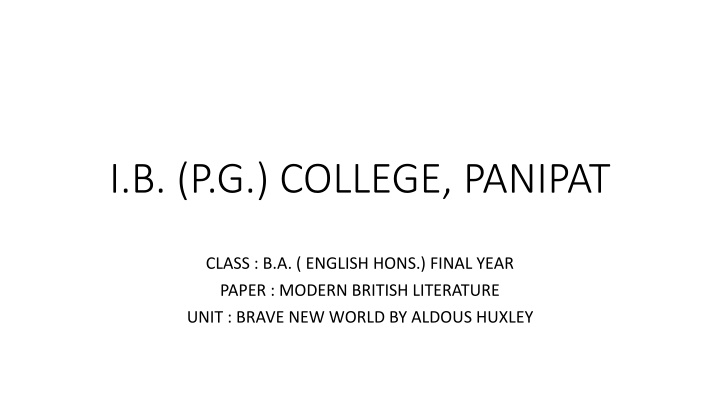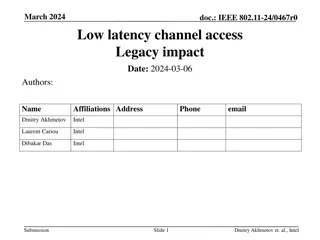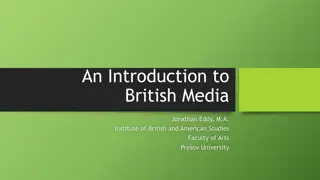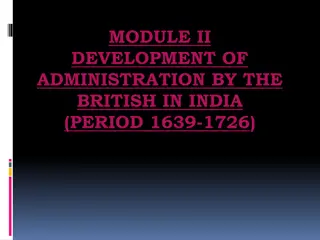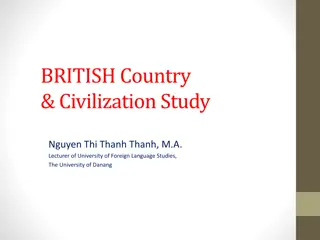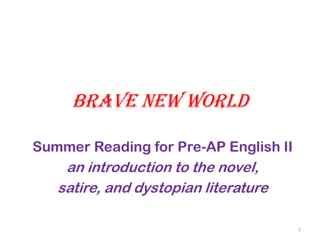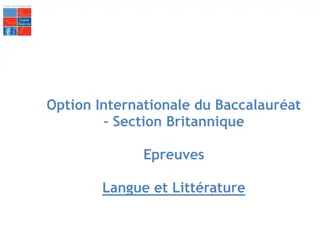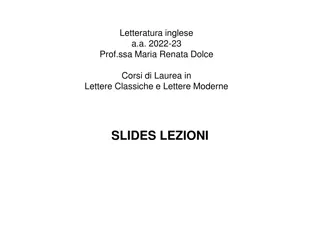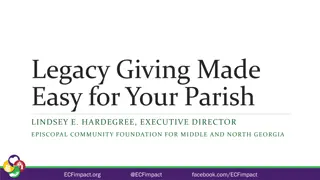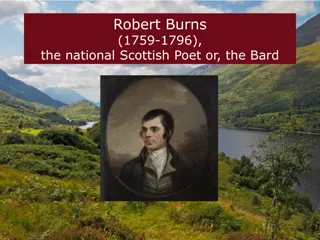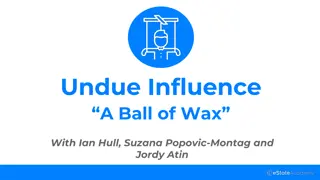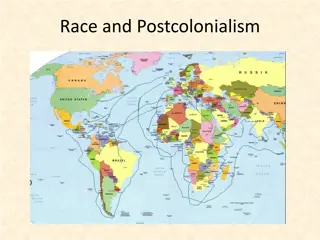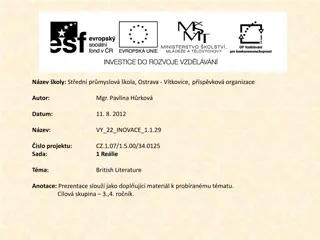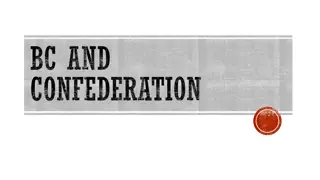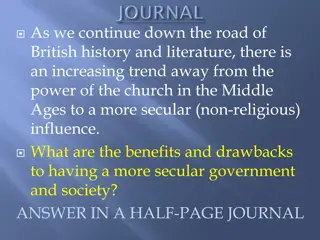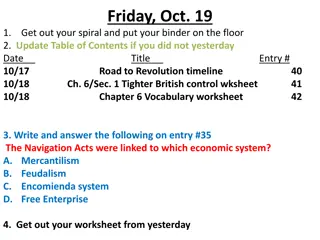Influence and Legacy of Aldous Huxley in Modern British Literature
Aldous Huxley, born into a literary and scientific family, overcame challenges such as near-blindness to become a renowned author. His works, including "Brave New World," explore themes of individuality, societal stability, and self-realization. Huxley's unique blend of science and literature allowed him to integrate cutting-edge scientific findings into his literary works, making him a significant figure in modern British literature.
Download Presentation

Please find below an Image/Link to download the presentation.
The content on the website is provided AS IS for your information and personal use only. It may not be sold, licensed, or shared on other websites without obtaining consent from the author.If you encounter any issues during the download, it is possible that the publisher has removed the file from their server.
You are allowed to download the files provided on this website for personal or commercial use, subject to the condition that they are used lawfully. All files are the property of their respective owners.
The content on the website is provided AS IS for your information and personal use only. It may not be sold, licensed, or shared on other websites without obtaining consent from the author.
E N D
Presentation Transcript
I.B. (P.G.) COLLEGE, PANIPAT CLASS : B.A. ( ENGLISH HONS.) FINAL YEAR PAPER : MODERN BRITISH LITERATURE UNIT : BRAVE NEW WORLD BY ALDOUS HUXLEY
PRESENTED BY PREETI PAL DEPARTMENT OF ENGLISH I.B.( P.G. )COLLEGE, PANIPAT
CONTEXT OF BRAVE NEW WORLD Aldous Huxley was born in Surrey, England, on July 26, 1894, to an illustrious family deeply rooted in England s literary and scientific tradition. Huxley sfather, Leonard Huxley, was the son of Thomas Henry Huxley, a well- known biologist who gained the nickname Darwin s bulldog for championing Charles Darwin s evolutionary ideas. His mother, Julia Arnold, was related to the important nineteenth-century poet and essayist Matthew Arnold. Raised in this family of scientists, writers, and teachers (his father was a writer and teacher, and his mother a schoolmistress), Huxley received an excellent education, first at home, then at Eton, providing him with access to numerous fields of knowledge. Huxley was an avid student, and during his lifetime he was renowned as a generalist, an intellectual who had mastered the use of the English language but was also informed about cutting-edge developments in science and other fields. Although much of his scientific understanding was superficial he was easily convinced of findings that remained somewhat on the fringe of mainstream science his education at the intersection of science and literature allowed him to integrate current scientific findings into his novels and essays in a way that few other writers of his time were able to do.
Aside from his education, another major influence on Huxleys life and writing was an eye disease contracted in his teenage years that left him almost blind. As a teenager Huxley had dreamed about becoming a doctor, but the degeneration of his eyesight prevented him from pursuing his chosen career. It also severely restricted the activities he could pursue. Because of his near blindness, he depended heavily on his first wife, Maria, to take care of him. Blindness and vision are motifs that permeate much of Huxley s writing. After graduating from Oxford in 1916, Huxley began to make a name for himself writing satirical pieces about the British upper class. Though these writings were skillful and gained Huxley an audience and literary name, they were generally considered to offer little depth beyond their lightweight criticisms of social manners. Huxley continued to write prolifically, working as an essayist and journalist, and publishing four volumes of poetry before beginning to work on novels. Without giving up his other writing, beginning in 1921, Huxley produced a series of novels at an astonishing rate: Crome Yellowwas published in 1921, followed by Antic Hayin 1923, Those Barren Leaves in 1925, andPoint Counter Point in 1928. During these years, Huxley left his early satires behind and became more interested in writing about subjects with deeper philosophical and ethical significance. Much of his work deals with the conflict between the interests of the individual and society, often focusing on the problem of self-realization within the context of social responsibility. These themes reached their zenith in Huxley s Brave New World, published in 1932. His most enduring work imagined a fictional future in which free will and individuality have been sacrificed in deference to complete social stability.
Aside from his education, another major influence on Huxleys life and writing was an eye disease contracted in his teenage years that left him almost blind. As a teenager Huxley had dreamed about becoming a doctor, but the degeneration of his eyesight prevented him from pursuing his chosen career. It also severely restricted the activities he could pursue. Because of his near blindness, he depended heavily on his first wife, Maria, to take care of him. Blindness and vision are motifs that permeate much of Huxley s writing. After graduating from Oxford in 1916, Huxley began to make a name for himself writing satirical pieces about the British upper class. Though these writings were skillful and gained Huxley an audience and literary name, they were generally considered to offer little depth beyond their lightweight criticisms of social manners. Huxley continued to write prolifically, working as an essayist and journalist, and publishing four volumes of poetry before beginning to work on novels. Without giving up his other writing, beginning in 1921, Huxley produced a series of novels at an astonishing rate: Crome Yellowwas published in 1921, followed by Antic Hayin 1923, Those Barren Leaves in 1925, andPoint Counter Point in 1928. During these years, Huxley left his early satires behind and became more interested in writing about subjects with deeper philosophical and ethical significance. Much of his work deals with the conflict between the interests of the individual and society, often focusing on the problem of self-realization within the context of social responsibility. These themes reached their zenith in Huxley s Brave New World, published in 1932. His most enduring work imagined a fictional future in which free will and individuality have been sacrificed in deference to complete social stability.
Brave New World marked a step in a new direction for Huxley, combining his skill for satire with his fascination with science to create a dystopian (anti-utopian) world in which a totalitarian government controlled society by the use of science and technology. Through its exploration of the pitfalls of linking science, technology, and politics, and its argument that such a link will likely reduce human individuality, Brave New World deals with similar themes as George Orwell s famous novel 1984. Orwell wrote his novel in 1949, after the dangers of totalitarian governments had been played out to tragic effect in World War II, and during the great struggle of the Cold War and the arms race which so powerfully underlined the role of technology in the modern world. Huxley anticipated all of these developments. Hitler came to power in Germany a year after the publication of Brave New World. World War II broke out six years after. The atomic bomb was dropped thirteen years after its publication, initiating the Cold War and what President Eisenhower referred to as a frightening buildup of the military-industrial complex. Huxley s novel seems, in many ways, to prophesize the major themes and struggles that dominated life and debate in the second half of the twentieth century, and continue to dominate it in the twenty-first.
After publishing Brave New World, Huxley continued to live in England, making frequent journeys to Italy. In 1937 Huxley moved to California. An ardent pacifist, he had become alarmed at the growing military buildup in Europe, and determined to remove himself from the possibility of war. Already famous as a writer of novels and essays, he tried to make a living as a screenwriter. He had little success. Huxley never seemed to grasp the requirements of the form, and his erudite literary style did not translate well to the screen. In the late forties, Huxley started to experiment with hallucinogenic drugs such as LSD and mescaline. He also maintained an interest in occult phenomena, such as hypnotism, s ances, and other activities occupying the border between science and mysticism. Huxley s experiments with drugs led him to write several books that had profound influences on the sixties counterculture. The book he wrote about his experiences with mescaline, The Doors of Perception, influenced a young man named Jim Morrison and his friends, and they named the band they formed The Doors. (The phrase, the doors of perception comes from a William Blake poem called The Marriage of Heaven and Hell.) In his last major work, Island, published in 1962, Huxley describes a doomed utopia called Pala that serves as a contrast to his earlier vision of dystopia. A central aspect of Pala s ideal culture is the use of a hallucinogenic drug called moksha, which provides an interesting context in which to view soma, the drug in Brave New World that serves as one tool of the totalitarian state. Huxley died on November 22, 1963, in Los Angeles.
UTOPIAS AND DYSTOPIAS Brave New World belongs to the genre of utopian literature. A utopia is an imaginary society organized to create ideal conditions for human beings, eliminating hatred, pain, neglect, and all of the other evils of the world. The word utopia comes from Sir Thomas More s novel Utopia (1516), and it is derived from Greek roots that could be translated to mean either good place or no place. Books that include descriptions of utopian societies were written long before More s novel, however. Plato s Republic is a prime example. Sometimes the societies described are meant to represent the perfect society, but sometimes utopias are created to satirize existing societies, or simply to speculate about what life might be like under different conditions. In the 1920s, just before Brave New World was written, a number of bitterly satirical novels were written to describe the horrors of a planned or totalitarian society. The societies they describe are called dystopias, places where things are badly awry. Either term, utopia or dystopia, could correctly be used to describe Brave New World.
PLOT ANALYSIS In telling the story of a civilization where suffering and pain have been eradicated at the price of personal autonomy, Brave New World explores the dehumanizing effects of technology, and implies that pain is necessary for life to have meaning. The story begins with three expository chapters describing the futuristic society of World State. In this society, marriage, family, and procreation have been eliminated, and babies are genetically engineered and grown in bottles. Citizens are programmed to be productive and complaisant through a combination of biological manipulation, psychological conditioning, and a drug called soma. A character named Mustapha Mond explains that in the previous era, people suffered from poverty, disease, unhappiness, and wars. A new society, named for the twentieth century automotive manufacturer Henry Ford, was formed to improve the human experience. These chapters do not include many significant elements of the plot, but they introduce the major themes of the novel. They signal to the reader that World State brainwashes its citizens to remain obedient, and suggest the reader should be skeptical about how truly utopian the society really is. The World State emerges as the antagonist of the novel, a sinister force that prevents characters from achieving meaningful happiness or free will.
The plot is initiated when Bernard, the novels initial protagonist, asks Lenina on a date to visit a Reservation. The reader can infer that Reservations serve as sort of human zoos where World State citizens can gawk at what civilization used to be like. We can soon tell that despite their mutual attraction, Bernard and Lenina are incompatible. Bernard does not want to participate in Obstacle Golf, but wants to go on a walk and get to know Lenina. Lenina wants to act like everyone else and enjoy the same activities without thinking or talking too much. We see that most of the main characters struggle to conform to society to one degree or another. Lenina is mostly content to follow the rules, but questions the government-enforced promiscuity, and feels oddly attracted to Bernard, despite the fact that he is an outsider. Bernard more profoundly questions World State s habit of drugging citizens, and wonders if his life might have more meaning if he experienced the full range of human emotion. Bernard s friend, Helmholtz, is even more disturbed by World State, and longs to create art that can act as a sort of x-ray for human experience, rather than propaganda that enforces World State policies. The conflict of the novel is developed on the eve of Lenina and Bernard s trip, when the Director tells Bernard about his own visit to the Reservation, raising further questions about how successful the society really is at creating an ideal existence. The Director describes being separated from the woman he was with, hurting himself, and having a painful and arduous trip back to the Reservation. The physical and emotional difficulty of the experience make it one of his most significant memories, and he admits that he still dreams about it. This recollection introduces the idea that pain is necessary for meaning, and also foreshadows John and Linda s relationship to the Director. At the Reservation, John and Lenina witness several scenes directly contrasting the two ideas of civilization presented by the novel: the Native American-like civilization of the Reservation, and the futuristic civilization of World State. Unlike in World State, residents of the Reservation grow old, have disease, hunger, and treat each other with cruelty. At the same time, they create art, experience love and marriage, and have a powerful religious system.
At the Reservation, Lenina and Bernard meet John, a white-skinned resident who Bernard realizes is the Director s son, setting up the eventual collision of the opposing cultures. John tells them his memories of growing up on the reservation with Linda, where he experienced maternal love and the joy of reading Shakespeare and learning skills, but also the pain of ostracism. Linda, still effectively brainwashed by her World State upbringing, speaks rapturously of her time in World State, and eagerly accepts Bernard s offer to bring her home. Back at World State John joyfully greets his father but the citizens, unaccustomed to displays of deep emotion, laugh at him. Bernard enjoys momentary popularity as the officials who once shunned him now clamor for time with John. Bernard s dissatisfactions melt away as he begins to feel powerful and important. John emerges as the novel s protagonist at this point, and our sympathies shift to him as he years for an emotional relationship with Lenina and worries about Linda, who exists in a drugged stupor. Lenina, confused by John s refusal to have sex with her, takes off her clothes and tries to embrace him, but John flies into a rage and beats her, showing the dark, dangerous side of human emotions and morality.
The climax of the novel occurs when Linda dies and John, deranged by grief, tries to stage a revolution. Helmholtz joins in, while Bernard watches, unsure whether it is safer for him to join or call for help. In this scene, Bernard becomes entirely unsympathetic for his cowardice and lack of morality. Mustapha Mond exiles Bernard and Helmholtz, then discusses religion, literature, and art with John. Citing Shakespeare, John argues for the importance of pain and difficulty, saying, I don t want comfort I want God, I want poetry, I want danger, I want freedom, I want goodness. Mond replies that John is asking for the right to be unhappy, a right that the book asserts is central to the experience of being human. The falling action of the novel takes place after John exiles himself from the city, and attempts to live a life as free of comfort and ease as possible. Reporters find him whipping himself, and soon he is surrounded by a crowd of onlookers demanding a show. The crowd s frenzy turns into an orgy, which John participates in. The next day, horrified by what he s done, he hangs himself.
MAJOR THEMES IN THE NOVEL The Use of Technology to Control Society: Brave New World warns of the dangers of giving the state control over new and powerful technologies. One illustration of this theme is the rigid control of reproduction through technological and medical intervention, including the surgical removal of ovaries, the Bokanovsky Process, and hypnopaedic conditioning. Another is the creation of complicated entertainment machines that generate both harmless leisure and the high levels of consumption and production that are the basis of the World State s stability. Soma is a third example of the kind of medical, biological, and psychological technologies that Brave New World criticizes most sharply. It is important to recognize the distinction between science and technology. Whereas the State talks about progress and science, what it really means is the bettering of technology, not increased scientific exploration and experimentation. The state uses science as a means to build technology that can create a seamless, happy, superficial world through things such as the feelies. The state censors and limits science, however, since it sees the fundamental basis behind science, the search for truth, as threatening to the State s control. The State s focus on happiness and stability means that it uses the results of scientific research, inasmuch as they contribute to technologies of control, but does not support science itself.
The Consumer Society: It is important to understand that Brave New World is not simply a warning about what could happen to society if things go wrong, it is also a satire of the society in which Huxley existed, and which still exists today. While the attitudes and behaviors of World State citizens at first appear bizarre, cruel, or scandalous, many clues point to the conclusion that the World State is simply an extreme but logically developed version of our society s economic values, in which individual happiness is defined as the ability to satisfy needs, and success as a society is equated with economic growth and prosperity.
The Incompatibility of Happiness and Truth: Brave New World is full of characters who do everything they can to avoid facing the truth about their own situations. The almost universal use of the drug soma is probably the most pervasive example of such willful self-delusion. Soma clouds the realities of the present and replaces them with happy hallucinations, and is thus a tool for promoting social stability. But even Shakespeare can be used to avoid facing the truth, as John demonstrates by his insistence on viewing Lenina through the lens of Shakespeare s world, first as a Juliet and later as an impudent strumpet. According to Mustapha Mond, the World State prioritizes happiness at the expense of truth by design: he believes that people are better off with happiness than with truth. What are these two abstract entities that Mond juxtaposes? It seems clear enough from Mond s argument that happiness refers to the immediate gratification of every citizen s desire for food, sex, drugs, nice clothes, and other consumer items. It is less clear what Mond means by truth, or specifically what truths he sees the World State society as covering up. From Mond s discussion with John, it is possible to identify two main types of truth that the World State seeks to eliminate. First, as Mond s own past indicates, the World State controls and muffles all efforts by citizens to gain any sort of scientific, or empirical truth. Second, the government attempts to destroy all kinds of human truths, such as love, friendship, and personal connection. These two types of truth are quite different from each other: objective truth involves coming to a definitive conclusion of fact, while a human truth can only be explored, not defined. Yet both kinds of truth are united in the passion that an individual might feel for them. As a young man, Mustapha Mond became enraptured with the delight of making discoveries, just as John loves the language and intensity of Shakespeare. The search for truth then, also seems to involve a great deal of individual effort, of striving and fighting against odds. The very will to search for truth is an individual desire that the communal society of Brave New World, based as it is on anonymity and lack of thought, cannot allow to exist. Truth and individuality thus become entwined in the novel s thematic structure.
The Dangers of an All-Powerful State: Like George Orwell s 1984, this novel depicts a dystopia in which an all-powerful state controls the behaviors and actions of its people in order to preserve its own stability and power. But a major difference between the two is that, whereas in 1984 control is maintained by constant government surveillance, secret police, and torture, power in Brave New World is maintained through technological interventions that start before birth and last until death, and that actually change what people want. The government of 1984 maintains power through force and intimidation. The government of Brave New World retains control by making its citizens so happy and superficially fulfilled that they don t care about their personal freedom. In Brave New World the consequences of state control are a loss of dignity, morals, values, and emotions in short, a loss of humanity.
Individuality: By imagining a world in which individuality is forbidden, Brave New World asks us to consider what individual identity is and why it is valuable. The World State sees individuality as incompatible with happiness and social stability because it interferes with the smooth functioning of the community. The Controllers do everything they can to prevent people developing individual identities. Bokanovsky s Process means that most citizens of the World States are biological duplicates of one another. Hypnopaedic slogans and Solidarity Services encourage citizens to think of themselves as part of a whole rather than as separate individuals. The Controller explains that people are sent to the islands when they have got too self-consciously individual to fit into community life. For Bernard, Helmholtz, and John, rebelling against the World State involves becoming self- conscious individuals. Bernard wants to feel as though I were more me. Helmholtz writes his first real poem about the experience of being alone, and when the Controller asks John what he knows about God, John thinks about solitude. In the end, John and Helmholtz choose to suffer in order to preserve their individuality. Bernard, however, never chooses individuality. He has been forced to be an individual due to his faulty conditioning. He tries to resist being sent to an island. For Bernard, individuality is a curse.
Happiness and Agency: Initially, the characters in Brave New World share the same ideas about what happiness is: freedom from emotional suffering, sickness, age and political upheaval, together with easy access to everything they desire. However, the characters differ in their understanding of the role personal agency plays in happiness. Bernard believes he wants personal agency, in that he wants to feel as though I were more me. Yet when the Controller offers Bernard the chance to live as an individual in Iceland, he begs to be allowed to stay in the World State he s not ready to sacrifice personal comfort for autonomy. Helmholtz seeks to express himself through poetry, but his idea that a lot of wind and storms are necessary for good poetry suggests that happiness and self-expression are incompatible, and he will only achieve personal agency through suffering. John seeks personal freedom through suffering and self-denial, but his self-imposed deprivations make him miserable. He gives in to the lure of pleasure by taking part in an orgy, then kills himself.
CHARACTERS IN BRAVE NEW WORLD John - The son of the Director and Linda, John is the only major character to have grown up outside of the World State. The consummate outsider, he has spent his life alienated from his village on the New Mexico Savage Reservation, and he finds himself similarly unable to fit in to World State society. His entire worldview is based on his knowledge of Shakespeare s plays, which he can quote with great facility. Bernard Marx - An Alpha male who fails to fit in because of his inferior physical stature. He holds unorthodox beliefs about sexual relationships, sports, and community events. His insecurity about his size and status makes him discontented with the World State. Bernard s surname recalls Karl Marx, the nineteenth-century German author best known for writing Capital, a monumental critique of capitalist society. Unlike his famous namesake, Bernard s discontent stems from his frustrated desire to fit into his own society, rather than from a systematic or philosophical criticism of it. When threatened, Bernard can be petty and cruel. Helmholtz Watson - An Alpha lecturer at the College of Emotional Engineering, Helmholtz is a prime example of his caste, but feels that his work is empty and meaningless and would like to use his writing abilities for something more meaningful. He and Bernard are friends because they find common ground in their discontent with the World State, but Helmholtz s criticisms of the World State are more philosophical and intellectual than Bernard s more petty complaints. As a result, Helmholtz often finds Bernard s boastfulness and cowardice tedious.
Lenina Crowne - A vaccination worker at the Central London Hatchery and Conditioning Centre. She is an object of desire for a number of major and minor characters, including Bernard Marx and John. Her behavior is sometimes intriguingly unorthodox, which makes her attractive to the reader. For example, she defies her culture s conventions by dating one man exclusively for several months, she is attracted to Bernard the misfit and she develops a violent passion for John the Savage. Ultimately, her values are those of a conventional World State citizen: her primary means of relating to other people is through sex, and she is unable to share Bernard s disaffection or to comprehend John s alternate system of values. Mustapha Mond - The Resident World Controller of Western Europe, one of only ten World Controllers. He was once an ambitious, young scientist performing illicit research. When his work was discovered, he was given the choice of going into exile or training to become a World Controller. He chose to give up science, and now he censors scientific discoveries and exiles people for unorthodox beliefs. He also keeps a collection of forbidden literature in his safe, including Shakespeare and religious writings. The name Mond means world, and Mond is indeed the most powerful character in the world of this novel. Fanny Crowne - Lenina Crowne s friend (they have the same last name because only about ten thousand last names are in use in the World State). Fanny s role is mainly to voice the conventional values of her caste and society. Specifically, she warns Lenina that she should have more men in her life because it looks bad to concentrate on one man for too long.
Henry Foster - One of Leninas many lovers, he is a perfectly conventional Alpha male, casually discussing Lenina s body with his coworkers. His success with Lenina, and his casual attitude about it, infuriate the jealous Bernard. Linda - John s mother, and a Beta. While visiting the New Mexico Savage Reservation, she became pregnant with the Director s son. During a storm, she got lost, suffered a head injury and was left behind. A group of Indians found her and brought her to their village. Linda could not get an abortion on the Reservation, and she was too ashamed to return to the World State with a baby. Her World State conditioned promiscuity makes her a social outcast. She is desperate to return to the World State and to soma. The Director - The Director administrates the Central London Hatchery and Conditioning Centre. He is a threatening figure, with the power to exile Bernard to Iceland. But he is secretly vulnerable because he fathered a child (John), a scandalous and obscene act in the World State. The Arch-Community-Songster - The Arch-CommunitySongster is the secular, shallow equivalent of an archbishop in the World State society. Pop - Pop was Linda s lover on the New Mexico Savage Reservation. He gave Linda a copy of The Complete Works of Shakespeare. The Warden - The Warden is the talkative chief administrator for the New Mexico Savage Reservation.He is an Alpha.
STYLE USED IN BRAVE NEW WORLD Brave New World is written in a detailed, unemotional style, making the technologies seem plausible and the characters pitiful. Though the majority of the plot centers on a handful of characters, the book opens with an extended explanation of the hatching and fertilizing processes of the World State, with little description of the characters themselves. The director, who describes the world we are about to enter, remains a vague figure himself: Old? Young?...It was hard to say it didn t occur to you to ask it. Huxley rarely includes physical descriptions of characters, reinforcing their interchangeability and lack of personal identity. When he does detail what a character looks like, their appearance is usually unappealing: Bernard is short, slight, and unattractive; Lenina has purple eyes and gums, and Linda is monstrous. This detached, slightly repulsed style of description makes the characters seem pathetic, and undermines the sense of World State as a pleasant place to live. Huxley jumps between scenes and repeats phrases to highlight the contrast between what characters might think if they had free will, and what they are conditioned to think by the World State. In the early chapters he juxtaposes scenes of Lenina and Fanny discussing their sex lives with short phrases describing the history of New World and its scientific advancements. This reminds the reader that World State, despite appearing a monolith of progress, is made of up of individuals who still bear some relationship to real people. Huxley also includes many of the programmatic phrases the citizens of New World heard in their sleep, a process called hypnop dia. Sayings like a gramme is better than a damn, ending is better than mending, and the song lyrics hug me till you drug me, honey are repeated throughout the book, mimicking the way these slogans work their way into characters brains. The phrases have a sing-song quality to them reminiscent of the childhood rhymes that readers already know. The softening of otherwise sinister concepts like brainwashing and genetic engineering is perhaps best seen in the phrase orgy-porgy, which Huxley invents to describe a literal orgy that combines religious worship with sexual promiscuity.
The novel also contains many references to Shakespeare, including quotes from several plays, likening the futuristic concerns of the book s characters and the timeless human struggles depicted by Shakespeare centuries ago. The novel takes its title from the line in The Tempest where Miranda, who has been sheltered from other humans, says, O brave new world, that has such people in it! Huxley modeled Brave New World on The Tempest, and quotes the play throughout the book, as well as Macbeth, Hamlet, and Othello. At one point John reads Shakespeare s poem The Phoenix and the Turtle to Helmholtz, who despairs of writing poetry with actual meaning and emotion. The many references to Shakespeare serve to underscore the meaninglessness of language to convey actual emotion in World State. The words and phrases of World State are propaganda, in that they contain no actual truth, and are tools of repression rather than enlightenment. Shakespeare, on other hand, represents the highest potential of communicating the human experience. Bernard cannot tell the difference between Shakespeare and New World jargon It s just a solidarity service hymn, he says, after John recites the poem marking him as less sensitive to his own humanity than either John or Helmholtz.
KEY FACTS ON BRAVE NEW WORLD Full Title Brave New World Author Aldous Huxley Type Of Work Novel Genre utopian novel, dystopian novel, science fiction Language English Time And Place Written 1931, England Date Of First Publication 1932 Publisher Chatto and Windus, London Narrator Third-person omniscient; the narrator frequently makes passages of objective description sound like the speech or thought patterns of a particular character, using a technique usually called free indirect quotation. Climax John incites a riot in the hospital in Chapter 15. Protagonists Bernard Marx, Helmholtz Watson, and John Antagonist Mustapha Mond Settings (Time) 2540 a.d.; referred to in the novel as 632 years After Ford, meaning 632years after the production of the first Model T car.
Settings (Place) England, Savage Reservation in New Mexico Point Of View Narrated in the third person, primarily from the point of view of Bernard or John but also from the point of view of Lenina, Helmholtz Watson, and Mustapha Mond. Falling Action Chapter 18, in which John isolates himself in a lighthouse and punishes himself; it ends with an orgy and his suicide. Tense Past Foreshadowing The director s memories of his trip to the Reservation foreshadow his relationship to John and Linda; Bernard s insecurities and dissatisfactions foreshadow his exile; John s longing to sacrifice himself foreshadow his suicide. Tone initially sardonic and detached; later, despairing and sympathetic. Themes The use of technology to control society, the incompatibility of happiness and truth, the dangers of an all- powerful state Motifs Alienation, sex, Shakespeare Symbols The drug soma is a symbol of the use of instant gratification to control the World State s populace. It is also a symbol of the powerful influence of science and technology on society.
DOES ART CAUSES AN UNSTABLE SOCIETY ? The Fordist society in Brave New World deprives citizens of art in an effort to maintain happiness, suggesting that art leads to social instability. Mustapha explains that beauty s attractive, and we don t want people to be attracted by old things. We want them to like the new ones. A societal structure that creates art and literature is now considered dangerous. According to Mustapha, you can t make tragedies without social instability. The world s stable now. People are happy; they get what they want, and they never want what they can t get. They would be unlikely to appreciate art, anyway: Brainwashing has successfully alienated them from the human experiences art seeks to illuminate, such as death, love, and pain. At the same time, art has the potential to enlighten people about their own oppression, and cause them to feel dissatisfaction. Dissatisfaction is bad for production, and leads to revolution. Universal happiness keeps the wheels steadily turning; truth and beauty can t, Mustafa explains. If the citizens of World State were exposed to experiences beyond their own, sensitized to their innate humanity, and inspired to question the meaning of their existence, the society would cease to function. John s experience on the Reservation suggests that rather than inciting social instability, art provides solace for the inevitable sorrows and difficulties of human experience. The social instability of the Reservation has nothing to do with art, but rather with the inequities innate to all civilizations whose citizens are not engineered and drugged into passivity. John feels pain, alienation, and ostracism before he learns how to read. Shakespeare, rather than making him more dissatisfied with his condition, alleviates his suffering by showing him the universality of his experience. The beauty and truth to be found in a play like Othello, he believes, is worth the suffering necessary to comprehend Othello s experience. Words, as Helmholtz believes, can be transformative: you read them and you re pierced. For John, this transformation of pain into meaning is the point of art, and the point of life. When Mustapha argues that the experience of reading Othello can be simulated through a Violent Passionate Surrogate without any of the inconveniences of actually reading the play, John insists that he likes the inconveniences. A society whose citizens are alive to their own humanity may be unstable, but it also contains the possibility of beauty and meaning.
While John and Mustapha initially seem opposed in their attitudes toward arts role in society, they ultimately agree that people need the emotional release known as catharsis in order to be happy. The two characters disagree about how to provide that release, with John arguing for the value of art, and Mustapha arguing for the safety and efficiency of drugs. Despite asserting that the absence of art is necessary for happiness, the state ensures that its citizens still experience pain, just through a different method. Pain, rather than being eradicated completely, has just been controlled, so as to be safe and useful. We prefer to do things comfortably, Mustapha says. His statement contains an inherent contradiction something can t be simultaneously painful and comfortable, or dangerous and safe. Art, because it is an experience that can t be controlled, is dangerous. So while art can incite social instability, it also provides the necessary catharsis that enables people to exist and find meaning in an unstable world
